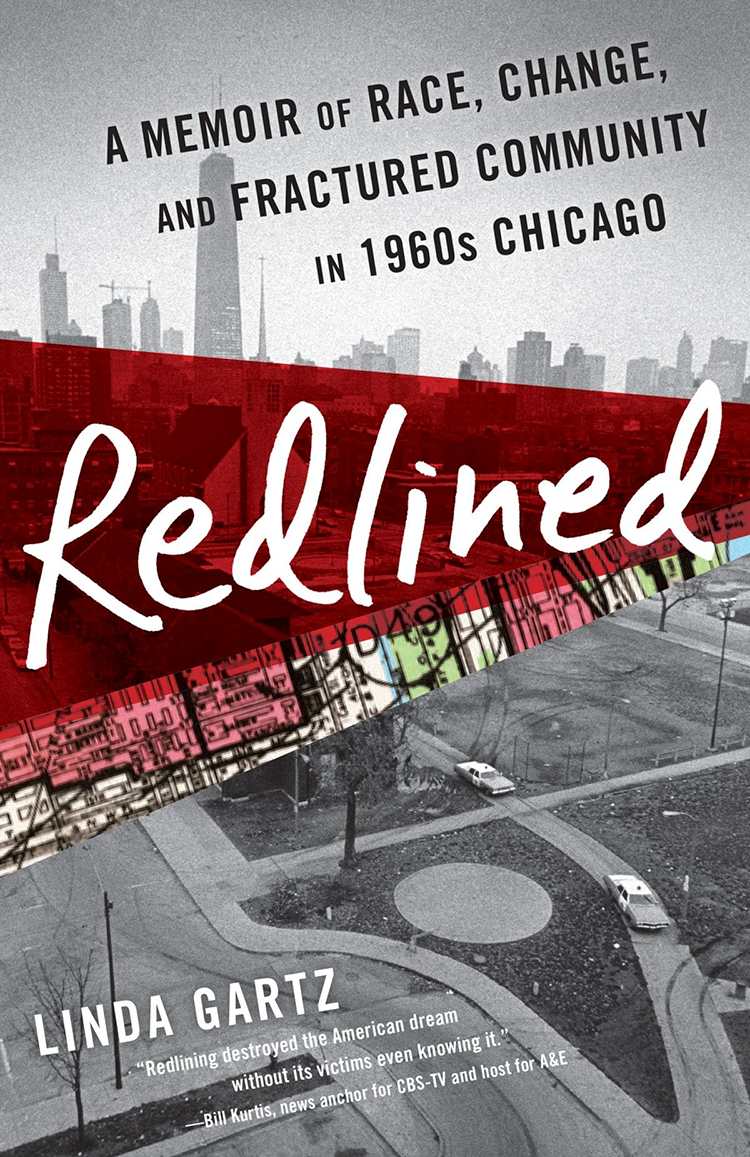Redlined Book Club Guide
“A stunning debut memoir. . .”
—Kirkus Reviews [starred]
“Beautifully and personally written with thought and clarity. In addition my book club loved it and it made for a great discussion.”
—Peggy Kocian

Product Details
Paperback | $16.95
Published by She Writes Press
April 3, 2018 | 315 pages
ISBN 978-1-63152-320-5
Redlined
By Linda Gartz
Category: Memoir | Chicago History | American History | Family Saga | Civil Rights Movement | Discrimination | 1960s Racial Unrest | Coming of Age | Marriage and Relationships | Mental Illness | Epistolary: Based on Letters and Diaries
The varied themes in Redlined make it the perfect choice for your next book club discussion. Based on a treasure trove of letters, diaries, photos, and much more, Redlined raises deep questions about racism, mental illness, young love, and the minefield of sex before birth control. Lively dialogue is guaranteed as well by topics such as coming of age during the heady and horrible 1960s, with its tumultuous societal upheavals: anti-war protests, race riots, and the sexual revolution.
Redlined is an Amazon Best Seller!
—Starred Kirkus Review
“. . . A captivating personal story told through the lives of her Chicago family, Gartz probes the invisible web of oppression that affected both whites and blacks. Redlining destroyed the American dream without its victims even knowing. But through the investigative work of Linda Gartz now we know.”
—Bill Kurtis, author, Peabody and Emmy Award-winner, journalist, producer, narrator, and news anchor for the CBS Television Network, and TV host for A&E
“Gartz’s unflinching family memoir offers both intimacy and insight into personal and historical injustices. She deftly interweaves a story of family striving, domestic resentments, and individual decency with the seismic cultural shifts of America’s social and sexual revolutions.”
—Amanda I. Seligman, chair, Department of History, University of Wisconsin-Milwaukee and author of Block by Block: Neighborhoods and Public Policy on Chicago’s West Side
“Many watched from afar as Chicago and other major cities underwent rapid racial change in mid-twentieth century America. Linda Gartz lived it. . . . With her sharp eye, excellent writing, and unique perspective, she brings this critical and turbulent period to life.”
—Steve Fiffer, coauthor of Jimmie Lee & James: Two Lives, Two Deaths, and the Movement that Changed America
“At every level this is an important story of personal hardship and societal blindness . . . ultimately intersecting with what has become the essential national topic, the racism that weaves itself through all our personal and shared histories.”
—Jim Grimsley, author of How I Shed My Skin
“Fearless and precise, Gartz has written a book that is impossible to put down. . . . An extraordinary achievement.”
—Sharon Solwitz, author of Once, in Lourdes
“Moving and deeply empathetic, Linda Gartz’s memoir illuminates the inner worlds of two generations of white working-class Chicagoans . . . who remained in a struggling black community long after their white neighbors had fled. The result is a deeply humane perspective on the ways that economic need, racism, and ideals of duty shaped the lives of urban white Americans in the twentieth century.”
—Beryl Satter, professor, Department of History, Rutgers University, and author of Family Properties: Race, Real Estate, and the Exploitation of Black Urban America
“In this remarkable memoir, Linda Gartz . . .[is] committed to finding the truth at every turn. [She] tracks not only her own experiences, but also the social and cultural changes that reshaped twentieth-century America.”
—Fred Shafer, School of Professional Studies, Northwestern University
“Deftly weaving together a treasure trove of detailed first-hand accounts, [Linda Gartz] provides an absorbing view into the life of a family unwittingly caught up in both its own domestic struggles and the turbulent social reckonings of the 1960s.”
—Anjali Sachdeva, author of All the Names They Used for God
“With tender and open-eyed concern, Linda Gartz adeptly explores how the human need for recognition and equality is waylaid both by doors slammed against legal access and connection and by the tyrannies of power wielded behind closed doors.”
—Anne Calcagno, professor, School of the Art Institute of Chicago, and author of Love Like a Dog
“Deeply personal yet wide in scope, Linda seamlessly blends her parents’ struggles as landlords on Chicago’s West Side with the injustices imposed on African Americans by racist housing policies. Redlined is a vivid and historic account of rapid racial change in the community Linda and I have both called home.”
—Mary Nelson, founding president of Bethel New Life, and faculty at Asset Based Community Development Institute at DePaul University (Chicago)
Redlined Discussion Questions
- Lil makes up her mind immediately upon meeting Fred at a dance: “He is definitely the man I want to marry.” What do Lil’s diary entries (the ones in the book are a miniscule sampling) tell you about Lil early on? What do you learn about Fred through her entries?
- Was Lil any more naïve about marriage that any other “madly-in-love” woman when she writes, “If we can’t be happily married, who can?”
- Lil and Fred had no serious marital problems until they bought their first home, usually a positive event. What went wrong? What responsibility does each of them have in their unraveling relationship?
- Lil and Fred look so happy in the 1958 photo at Caruso’s Restaurant (Chapter 15, page 83). Yet their relationship had already taken many blows. Why are they still happy? Could either Lil or Fred truly empathize with the other’s needs?
- Did you feel you sided with one of the main characters over the other?
- Is it a fair statement that Lil became her mother (Grandma K)? If you’re a woman discussing this book, what impact did your mother have on the woman you are today? Did you try to avoid being like your mom, or are you pleased to have taken on aspects of your mom’s personality?
- Mother-daughter relationship:
a. If you’re of the same, or close to the same, age as Linda, do you think her mother’s adversarial relationship with Linda’s desire for independence, to live with Bill, etc. was typical of that generation? How did you react to Lil’s fury with Linda?
b. If you’re of a younger generation, how do you react to the controls on women’s sexuality (Northwestern disparate hours for men and women; viewing sex outside of marriage as immoral, the controls on birth control, etc.)? - What did you think of Linda’s decision to move in with Bill, although she knew it would infuriate and hurt her mother? Was she self-centered, or was she a “pioneer,” as Lil wrote in her diary?
- Fred’s traveling job:
a. By the time Fred lands a Chicago-based job in 1962, he had traveled for thirteen years. Had his travel irretrievably damaged their relationship?
b. Many husbands had/have traveling jobs, leaving wives at home alone, and it doesn’t have such a damaging effect. Was there something unique about Lil’s and Fred’s situation?
c. Did you agree with Linda’s assessment of the impact Grandma K’s presence in the home may have had on Fred keeping his job with the NBFU?
d. What might have been different had he found a non-traveling job sooner? - To what extent, if any, did the deterioration of West Garfield Park, and the increasing difficulties of being a landlord there, undermine Fred’s and Lil’s marriage?
- At which points in the story do you feel you’re listening to the young Linda and in which parts do you hear the older Linda, looking back and trying to understand her parents and her younger self?
- Do you feel you get a balanced view of the family, or does the author take sides? Do you think her reflections are an important part of the story, or would you rather she had let you draw your own conclusions about what happened?
- In the end, is there true “love and devotion” between Fred and Lil, or is their relationship better because Lil is in control? How does she use her “control?”
- Linda could have just put away all the letters and diaries after reading them. Why do you think she wrote this book?
- Before reading this book, were you aware of the federal government’s culpability in segregating communities through the use of redlining–and its consequences for blacks and whites?
- Do you think the creators of redlining (HOLC had the philosophy that “inharmonious racial and ethnic groups” should not live together) understood what its ultimate consequences would be (overcrowding, economic decline, blockbusting, white flight, etc.)?
- “Redlining” is back in the news again even though it supposedly ended almost exactly fifty years before this book was published (the Fair Housing Act was passed April 11, 1968).
a. Can you describe how redlining’s legacy lives on in cities across the country?
b. Can you share with the group any specific knowledge you have of “modern-day redlining” or present consequences of these past practices, based on articles you’ve read or reports you’ve heard? - Because of their inability to invest in property, the typical black family today has about 6-7% the wealth of a typical white family, and families were unable to pass down that wealth to their children as white families could.
a. What can or should our government, which caused this disparity through redlining, do to rectify it?
b. Can “reparations” for the damage done to African Americans ever come to pass? (The black writer, Ta-Nehisi Coates, wrote “The Case for Reparations” in The Atlantic). - Many people still lay the blame for the poverty and violence in “inner city” neighborhoods, like West Garfield Park squarely on the residents. Is there some, or any, justification for this point of view? Do you think the residents should be able to pull themselves out of poverty and segregation?
- Did the whites who fled when blacks started moving into their neighborhoods have justification for leaving? Did these mostly working-class whites have a point to feel resentful of being called “racist” by elite whites in suburbs and wealthy areas who would never have to face the prospect African Americans buying in their expensive communities?
- How would you characterize racism in Chicago (and other large cities) today vs. the time period covered in the book?
- Many aspects of life have improved for African Americans since the Civil Rights Movement. What things are obviously better and which haven’t changed?
- Blacks often talk speak of “white privilege” which makes many whites bristle. What is white privilege? (Of course, if there’s no black person in the group, this may be a tough one to really get right).
- Fear of the “other,” drove a lot of the racism that Linda’s family and neighbors felt. Do you see that manifested again today?
- Sexism in Redlined’s era:
a. If you’re of a similar generation to Linda, do you relate to the sexism inherent in the era (e.g., “Learn typing and shorthand,” as the best way to achieve? (No denigration of those skills intended here).
b. If you’re of a younger generation, (50 or under qualifies!) how did you react to the era depicted?
c. Despite Lil’s rigid sexual morality, how was she an a-typical” woman of her era? - Mental Health:
a. What did you learn about dealing with a mentally ill family member from this book?
b. Although we have better medicine for psychosis now, mental health care is still expensive and out of reach for most families. Have things improved for mental health care overall in our society? If so why are so many of the mentally ill in prison, among the homeless, without community health services?
c. What did you think of Lil’s decision not to place her mother in an institution sooner than she did? What do you think you would have done, as an only child? Was she caught between the proverbial “rock and hard place?”
d. Was Lil more concerned about her mother than the safety of her family or protecting her marriage?
e. What did you think about the way Fred handled his mother-in-law’s psychosis? - If you lived through the era described in the book, did Redlined capture the essence of the time for you? Were your experiences of the society at large different?
- If you grew up subsequent to the ‘50s and ‘60s, does Redlined conform to what you know about the era? If not, how does it differ? What was the most surprising thing you learned historically from reading this book?
- How would you describe this book to someone else? What’s the most compelling reason they should read it? Who would enjoy it most or least?


